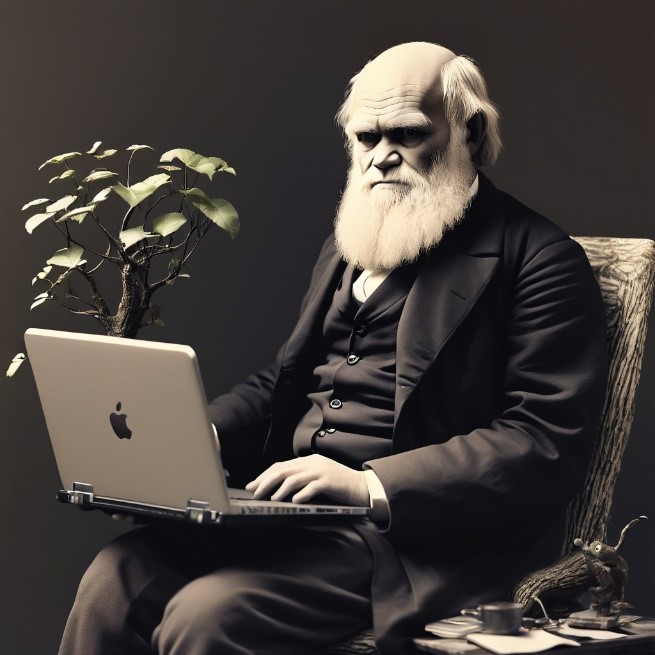Blog: Peter the Speaker delivering inspirational business workshops
Blog from our partners
Born in Shrewsbury, and having set up several business ventures covering both new products and services, ‘Peter the Speaker’ is most well-known for having successfully pitched in TV’s Dragons Den.
With a background and training in psychology, and as an inventor and former stand-up comedian, Peter the Speaker combines all three skills to deliver unique, inspirational and entertaining business workshops.
Peter returns soon to deliver a series of masterclasses.
In this blog, he highlights why Charles Darwin has been an inspiration to him and his approach to business.

Charles Darwin
Why Charles Darwin would have been a brilliant entrepreneur
By Peter the Speaker
If you’ve attended one of my training sessions, I presented you with business concepts and ideas you’d never heard before – completely new ways of understanding the business world. But, I didn’t want to give you a new model or a point of view; I wanted to explore the truth.
If I could identify one person who inspired me, I would not point to a teacher or business theorist, I would choose Charles Darwin. Let me explain why.
When you observe the world around you, you’ll discover patterns – things which recur again and again. These patterns tell us things are not random. Our world and our behaviour are governed by rules. For example, I’ve observed that every successful advert has just six components; there are four ways to create a price point, and there’s just one reason we keep buying the same brands of products and services. I present these as self-evident facts.
Darwin’s understanding of the world was based on observing patterns to discover fundamental truths. His discoveries are not, however, limited to the natural world, they can be applied to business.
Variation / Unique Selling Points
Darwin understood the need for variation – a mutation, something born with different features or characteristics forms the basis of new species. As new businesses, we call the observable differences between our products and services “Unique Selling Points”.
But, the origin of new products or services is often not innovation but evolution. New products and services are usually variations of those that went before. If we add value to an existing product or service, we create something new. But every valuable product or service sits within just three classifications:
- Universal Value. A product or service which can save time, money or effort will have value irrespective of what it is or the marketplace it’s being sold. These are known as cost-saving products and services.
- Specific Value. If a product or service is able to provide a superior solution to the problem we are trying to resolve it will have value within it’s specific marketplace. These are known as superior products and services.
- Individual Value. A product or service which can appeal to a customer’s tastes or feelings may be valued on an individual basis. These are known as engaging products or services.
Every purchase you have ever made, where you had a choice between two brands, was predicated on one, two or all three classifications.
Natural selection / supply and demand
Valuable new products and services are not predestined to be chosen by our customers. A process of selection takes place governed by the law of “supply and demand”. New products and services tend to be popular where the demand is not being met by supply.
If an entrepreneur can create a product or service, to meet a significant demand not currently being supplied, they are likely to find potential customers will be more motivated to make a purchase. The marketplace selects those products and services which are popular by the law of supply and demand.
Survival of the Fittest / business sustainability
Over time, what we value changes; supply and demand changes. Those business which are able to survive, prosper and grow are those which are able to adapt to these changes. Throughout the last hundred years, large companies dominated their global markets but, just like the dinosaurs before them, many died out because they were unable to adapt and evolve.
Smaller businesses may not have the resources of larger companies but they have usually have a greater ability to change and adapt as their environment, the marketplace, changes around them. The businesses which will prosper in the future are those that will best adapt to the changing market-place.
So why Darwin?
Darwin understood that the environment determines who survives and who dies and that we need to evolve to meet those challenges. It is this understanding that determines which businesses will thrive and which will become extinct.
Our enthusiasm, passion and confidence will drive us forward, but it is in our knowledge and understanding that our future business successes will lie and that’s why Darwin would have been a brilliantly successful entrepreneur…
“Ignorance more frequently begets confidence than does knowledge” Charles Darwin, The Descent of Man, 1871.
© Petvictus Ltd, 2024
Following his popular workshop in January Peter returns with a series six interactive, engaging and inspiring business workshops giving you the knowledge, skills and confidence to take the next steps in your business journey.
You can attend any or all of the sessions.
In the first hour and half, you’ll learn essential business skills; in the second half, you can practice your new skills.
For further information and to book : https://www.eventbrite.co.uk/e/evolve-or-dissolve-mastering-the-art-of-business-evolution-tickets-838589201877?aff=oddtdtcreator

